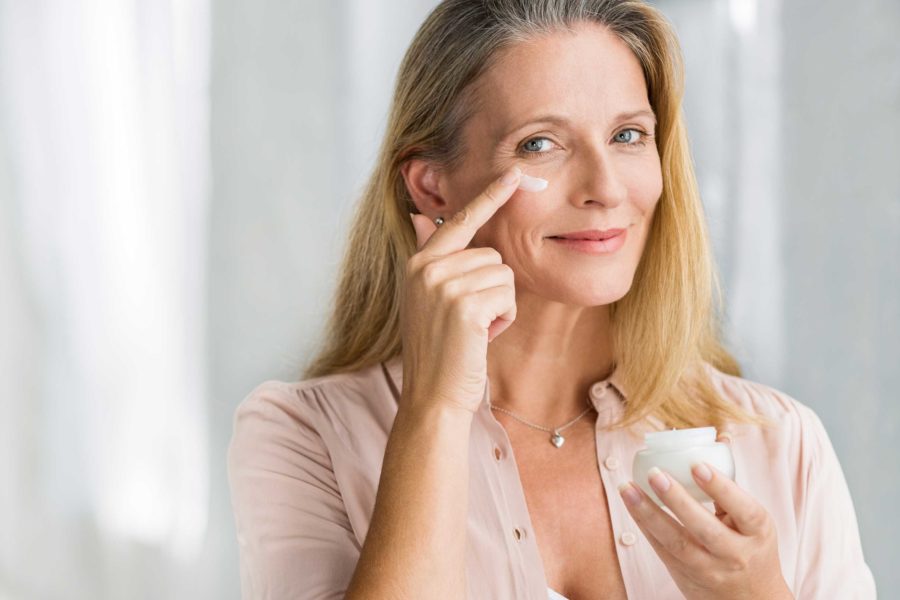There’s something to be said about aging gracefully.
Not a one of us can escape eventual wrinkles, sagging and drooping, but that doesn’t mean we can’t fight it — without dropping thousands of dollars on medical procedures.
Enter the holy grail ingredients of anti-aging skin care: vitamin C, vitamin A, and collagen. Each boasts different functions and can have different effects. Here’s what you need to know.
Collagen
Collagen is the main structural protein that holds our body together, including our skin. Collagen production tends to drop as we age, so it’s natural to think that applying more collagen to the skin would combat this, right? Wrong.
Mara Andreasen, a licensed esthetician at Brad Duncan Skin Care spa in Boston, says topical collagen “is kind of worthless” for anti-aging specifically because “the collagen molecule is just too large, it’s not going to penetrate the skin.”
However, although applying a moisturizer formulated with collagen would be useless for preventing wrinkles as a 20 or 30 year-old, “for women who are more mature, a moisturizer with collagen is going to hydrate the skin and make it plump,” says Andreasen.
While applying collagen might have a short-term benefit for mature skin, what works better in the long term are facial treatments that naturally energize the collagen your skin already has.
“You want to do treatments that help ignite your own elastin and collagen naturally, instead of just adding superficial collagen,” says Robin Erb, an esthetician and makeup artist based on Newbury Street in Boston.
Collagen activating treatments include cupping, facial rejuvenation, facial massages or microneedling.
Products you might want to try:
Jade Facial Roller by Herbivore
Available at Sephora, $30
Rose Quartz Gua Sha tool by Skin Gym
Available at Credo, $32
Vitamin C
According to Andreasen, vitamin C helps with photo-aging, sun spots and post-inflammatory hyperpigmentation.
“It’s a great antioxidant to use during the day,” she says. “It helps protect the skin from damaging UV radiation, when worn under sunscreen.”
There are different formulations of vitamin C, with varying levels of potency. The most potent form is L-Ascorbic Acid, or pure vitamin C. It is commonly found in beauty products, but “it can be irritating” if a large amount is applied on the skin at once, says Andreasen.
Less potent derivatives of vitamin C are ascorbyl palmitate or magnesium ascorbyl phosphate, which are not as irritating to the skin and not as unstable as L-Ascorbic Acid, which becomes inactive when exposed to light or air.
For something even more gentle on the skin, Erb recommends natural essences such as rose hip oil, sea buckthorn oil, or evening primrose oil, which are rich in vitamins A, C and E.
Although the results aren’t as immediate with natural essences, with consistent use, the long term results can be rewarding.
Products you might want to try:
C E Ferulic with 15% L-Ascorbic Acid by SkinCeuticals
Available at skinceuticals.com, $166
Starlight Serum by Erb + Owens
Available at Robin Erb Skincare and Makeup, $40
Vitamin A
Vitamin A is typically used to manage fine lines, wrinkles and skin texture. It comes in many forms, including in the chemical compound most commonly associated with anti-aging cosmetics: retinol.
According to Andreasen, retinol is an exfoliating version of vitamin A. It becomes damaged and inactive once exposed to UV light, “which is why you would only wear it at night.”
Erb says retinol and other retinoids speed up cell turnover in the skin. “Our cells die every day, and sometimes dead cells can build up, resulting in dry or clogged skin,” she says. “So you can turn over those cells a lot faster, as well as exfoliate with retinol. But, it can be harsh on the skin.”
If you’ve never used retinol before, you skin might get red, irritated or dry. “That doesn’t mean it’s not safe, or that you’re allergic to vitamin A,” says Andreasen. “It just means your skin needs time to build up a tolerance to it.”
While Andreasen says at-home application of retinol is safe and effective if applied slowly and in small amounts at first, Erb adds that sometimes it’s best to “leave the heavy lifting to someone like me at a spa.”
“Everybody’s skin wants vitamin A, but everybody’s skin responds to it differently,” says Andreasen. “It’s usually a slow and steady wins the race approach for that type of topical ingredient.”
Softer versions of vitamin A found in some over-the-counter products include retinyl acetate, retinyl palmitate or retinyl aldehyde, according to Andreasen.
“You can wear these versions of vitamin A every day, with less risk of a retinoic reaction, although it takes longer to take an effect,” she says. Retinol can be the immediate fix but “a slower, steadier version of vitamin A used constantly is a nice way to go, too.”
Products you might want to try:
Clinical 1% Retinol Treatment by Paula’s Choice
Available at paulaschoice.com, $58
Retinoic Nutrient Face Oil by Tata Harper Skincare
Available at Sephora, $48



 4 min read
4 min read


